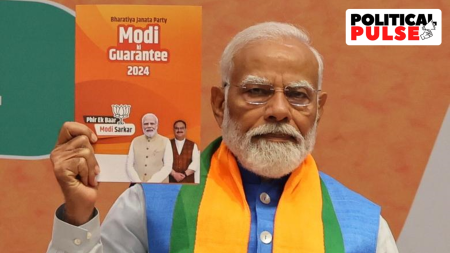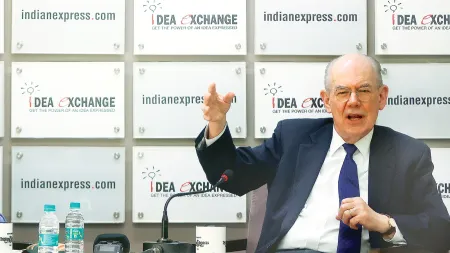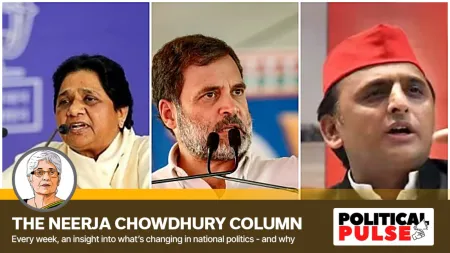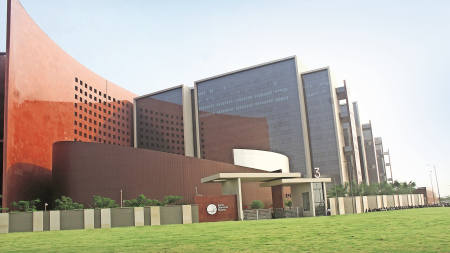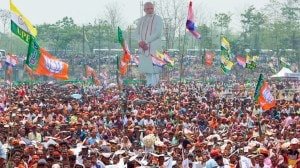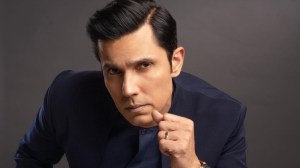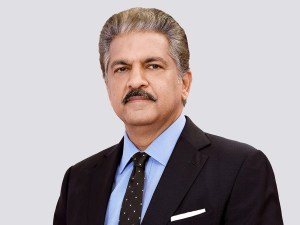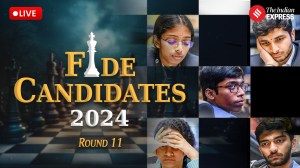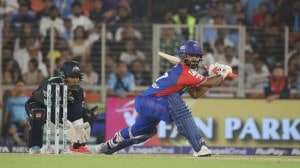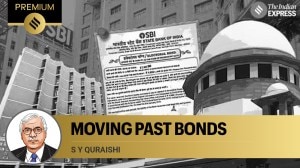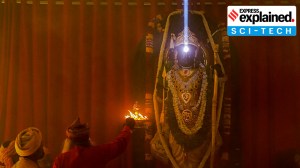- India
- International
Prashant Kishor: Not winning or losing only due to polarisation… Has Opposition persisted with any cause
Speaking at Express Adda, Prashant Kishor also said that for the next 20-30 years at least, Indian politics would revolve around the BJP, and that he does not share the assessment that the BJP will dwindle on its own.
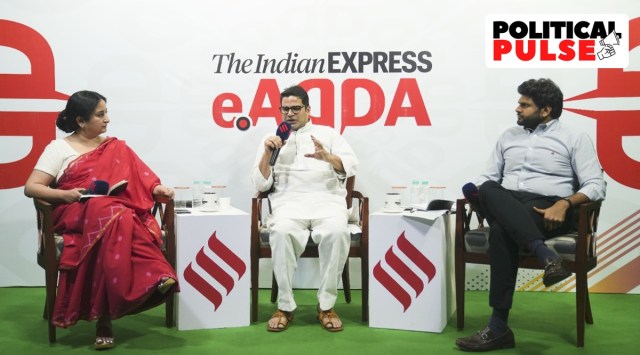 Prashant Kishor was in conversation with Anant Goenka, Executive Director, The Indian Express, and Vandita Mishra, National Opinion Editor, The Indian Express. (Photo: Abhinav Saha)
Prashant Kishor was in conversation with Anant Goenka, Executive Director, The Indian Express, and Vandita Mishra, National Opinion Editor, The Indian Express. (Photo: Abhinav Saha)Arguing that the role played by polarisation in elections is “much overhyped, than what is actually on the ground”, election strategist Prashant Kishor said that “for every Hindu who is impressed with the BJP’s narrative of Hindutva, there is one Hindu who is not”, and that the Opposition needs to remember that.
Speaking at Express Adda here on Tuesday, Kishor also said that for the next 20-30 years at least, Indian politics would revolve around the BJP, and that he does not share the assessment that the BJP will dwindle on its own.
Urging Opposition parties to “appeal to those Hindus who are not convinced with the BJP’s narrative of Hindutva”, Kishor advised the Congress to come to terms with being in the Opposition and learn how to be in the Opposition and behave like an Opposition party. With his talks with the Congress on how to revive the party collapsing recently, Kishor said the Opposition should try to create a “narrative and stay put”, and not worry about faces. “If you have the narrative and you persist with it… more likely than not faces will emerge from it,” he said.
Kishor was in conversation with Anant Goenka, Executive Director, The Indian Express, and Vandita Mishra, National Opinion Editor, The Indian Express.
Asked about increasing polarisation, he said: “This polarisation thing… it is much overhyped than what actually is on the ground. The methods of polarisation have changed, (but) how you used to polarise, say 15 years back, its impact is largely the same. And we have looked at the electoral data. What we call elections in the immediate aftermath of the most polarising events… we have found that you are not able to mobilise more than 50-55 per cent of the community, no matter what the polarising event was.”

Saying that most people who lose blame their defeat on polarisation, Kishor added: “Suppose you are trying to polarise the Hindu community, the majority… For every Hindu, if the polarisation level was 50 per cent, or 50 per cent voted because they got polarised or influenced by polarisation… for every one Hindu who polarised and voted in favour of one party, there was one Hindu who was not polarised.”
The assumption that Hindu-Muslim polarisation can decisively make “someone win or lose elections” was wrong, said Kishor, who is testing the political waters with a new front in Bihar. “Lot of people whom you meet casually mention that all Hindus have become polarised. Sab saffronise ho gaye India mein. In India, the BJP is getting 38 per cent of the votes. Assume for a minute, for argument’s sake, that everyone who is voting (for the BJP) is voting because they are convinced about the BJP’s way of Hindutva or their propagation of Hindutva or saffronisation… A simple math student will tell you that… 38 per cent is the BJP vote share… less than half the Hindus are voting for the BJP,” he said.
In Uttar Pradesh, for instance, Kishor said, the BJP got 40 per cent votes. “You have Hindus there… 80-82 per cent. That means less than 50 per cent Hindus have voted for the BJP… Maybe it (polarisation) is playing its part, but you are not winning or losing only because of polarisation. So… from the BJP point of view… it is not only because of Hindutva. It is Hindutva, nationalism plus beneficiaries (of its schemes), the individual and household-level beneficiaries. This combination together gives a very compelling narrative in its favour.”
Kishor also argued that the “nationalism plank” of the BJP could be blunted through “sub-regionalism” in state elections, and that the BJP’s “relative under-performance” in state elections was because of this.
At the same time, Kishor said, it was a reality that the BJP would remain a “formidable electoral party” for decades to come. “Once you secure 30 per cent plus votes at the India level, nobody can wish you away. It is not something which will come down on its own. That said, it doesn’t mean that they will continue to win every election. It means that, like for the first 40-50 years, politics in India (revolved) around the Congress – either you were with the Congress or opposed to the Congress – the next 20-30 years I see Indian politics revolving around the BJP. You are with the BJP or opposed to it.”
It is wrong to think the BJP will come down on its own, Kishor said. “This desperation that just because there is a BJP, there has to be an Opposition and hence some Opposition will emerge… I think that is wishful thinking.”
Kishor did not rule out one emerging, though, within the next two years “if you do the right thing”, adding that it is up to political parties to capture issues that affect people’s lives.
On the issues with the Congress, he said it is yet to come out of the mindset that it is not the party in power now. For instance, he added, a party in power may get more media coverage than when it is in the Opposition. “The Congress today goes on the streets, they do something, and they don’t get similar media attention or traction… Their natural reaction or response is how do we do anything because the media does not cover us. They completely blank us (out). This shows the mindset, the DNA of a ruling party which is yet to come to terms of being an Opposition party. That is the fundamental problem I see in the thought process of the way the Congress responds to a situation.”
Advising the Opposition to stay put as “persistence pays in a democracy”, Kishor said: “Look at Shaheen Bagh, look at farmers’ protests. Lot of people said ‘Where is the face? Where is the organisation, where is the media support?’… Some people came together and sat for a cause and sat and sat and sat till people took notice. And that persistence made the government take notice and, in both cases, take a step back.”
He said it was failure on the part of the Opposition that it has not persisted with a cause. “Take Covid. A lot of people ask why, despite what we saw during Covid, there is no electoral setback (to the BJP). But where was the protest? Where is anything from the Opposition that has lasted one year or two… like trying to carry the voice of the people who have suffered during Covid and holding the government accountable? You do a tweet here or a press conference there. That is not what mass protest is about.”
The Express Adda is a series of informal interactions organised by The Indian Express Group and features those at the centre of change.
Apr 18: Latest News
- 01
- 02
- 03
- 04
- 05








